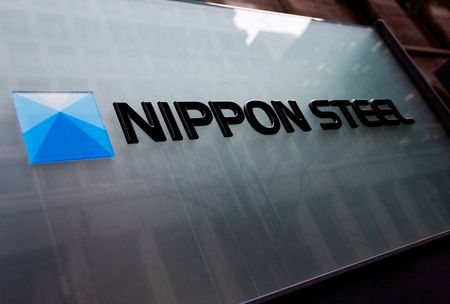By Yuka Obayashi
TOKYO (Reuters) -Nippon Steel and U.S. Steel sent a letter on Sunday to U.S. President Joe Biden about their planned $15 billion merger after media reported that he was preparing to block the deal, a spokesperson for the Japanese steelmaker said.
The spokesperson did not provide details about the letter’s content, but said it was signed by Nippon Steel Chief Executive Eiji Hashimoto and U.S. Steel CEO David Burritt as well as other executives.
U.S. Steel did not immediately respond to a request for comment outside of U.S. business hours. The U.S. embassy in Japan did not immediately have comment.
Japan’s biggest steelmaker is pursuing a cash deal to buy the 123-year-old U.S. Steel, despite resistance from Biden, the United Steel Workers (USW) union and many members of Congress while a U.S. national security review is conducted.
The deal has also been opposed by both Republican presidential nominee Donald Trump and Democratic nominee Kamala Harris. Both are vying to win the critical swing state of Pennsylvania, where U.S. Steel is headquartered.
The Committee on Foreign Investment in the United States (CFIUS) told the companies in an Aug. 31 letter seen by Reuters the deal would create national security risks because it could hurt the supply of steel needed for critical transportation, infrastructure, construction and agriculture projects.
A top Nippon Steel executive and U.S. Steel’s CEO met with senior U.S. officials on Wednesday in an effort to salvage the deal, a person familiar with the matter said.
The outcome of the meeting was not immediately clear.
The Japan Business Federation and a number of U.S. business groups, in a letter to Treasury Secretary Janet Yellen on Wednesday, raised concerns that the Biden administration’s national security review of the deal is being unduly influenced by political pressure.
On Friday, Japan’s Minister of Economy, Trade and Industry Ken Saito declined to comment on the deal, saying that doing so would interfere in U.S. domestic affairs.
But Saito added: “It is extremely important that Japanese and U.S. companies continue to make transactions and the growth in deals constitutes a key element of the strong economic relationship between the two nations.”
(Reporting by Yuka Obayashi and John Geddie, Additional reporting by Kantaro Komiya; Editing by Edwina Gibbs)










